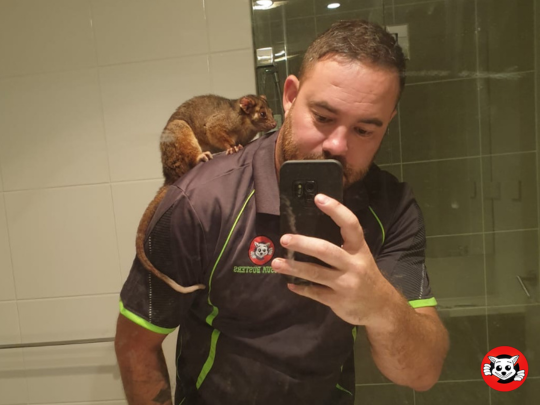Often misunderstood as pests, possums are, in fact, invaluable contributors to our ecosystems. Whether spotted in urban backyards or rural landscapes, it’s essential to remember that these creatures play a pivotal role in maintaining ecological balance.
While sometimes their removal becomes necessary, such actions must be carried out ethically, considering the significant role possums undertake in our ecosystem.
The Ecological Value of Possums
Possums are not just inhabitants of our environment; they actively preserve its health and diversity. Their contributions range from helping with seed dispersal and controlling insect populations to forming an integral part of the food chain.
Seed Dispersal
One of the lesser-known roles of possums is their contribution to seed dispersal. As they move around foraging for food, seeds from various plants stick to their fur or are passed through their digestive system. This inadvertent transportation of seeds helps propagate numerous plant species, aiding in maintaining biodiversity in our ecosystems.
Pest Control
Possums help keep specific pest populations in check. As omnivores, their diet includes many insects, acting as nature’s own pest control. Consuming these pests they help control their numbers, contributing to a healthier and more balanced ecosystem.
Part of the Food Chain
Possums also form a vital link in the food chain. They serve as prey for larger predatory animals, thereby controlling the population of these predators. This interdependence underscores the importance of possums in maintaining ecological balance.
The Consequences of Unethical Removal
Unethical practices in possum removal can lead to severe repercussions, extending beyond the immediate harm to the possum population. They can disrupt the balance of local ecosystems and, in places like Australia, even result in legal penalties.
Ecological Disruption
Possums play a pivotal role in maintaining ecological balance through seed dispersal, pest regulation, and as part of the food chain. Inappropriate or rapid removal of possums can upset this delicate balance, leading to an explosion in specific pest populations and a decline in plant diversity due to hampered seed dispersal.
Legal Repercussions
In Australia, possums are protected by wildlife conservation laws. Any harm, capture or disruption of their habitats without proper authorisation is considered illegal and attracts strict penalties, including fines and potential imprisonment.
Ethical Removal Practices
When possum removal becomes necessary, it must be done ethically. This includes respecting local wildlife laws, using humane trapping methods, and ensuring safe relocation of possums.
Adherence to Local Wildlife Laws
Compliance with local wildlife regulations is not just a legal obligation but also an ethical duty. These laws are designed to safeguard our wildlife and preserve the balance of our ecosystems.
Use of Humane Traps
A key element of ethical removal is humane options that do not harm or distress the possums. These traps should be monitored regularly to ensure captured possums are not left distressed for prolonged periods.
Safe Relocation
Relocating possums safely to suitable environments is crucial. Here, they can continue their essential ecological roles. Ideally, this process should be undertaken by professional possum removal services, trained in humanely and efficiently handling these creatures.
Professional possum removal services ensure that possum removal is done ethically and legally. They possess the necessary knowledge, skills, and authorisation to deal with possums, ensuring their welfare while maintaining the balance of our ecosystems.
Preventative Measures and Coexistence
Living in harmony with possums is achievable and beneficial for the overall health of our ecosystems. Several strategies can encourage coexistence, such as safeguarding food sources, implementing possum-deterrent techniques on trees and buildings, and emphasising the importance of habitat conservation.
Securing Food Sources
Possums are known to be opportunistic eaters, so they are often drawn to unsecured garbage bins or accessible pet food. To discourage this, it’s recommended that these potential food sources be secured or stored indoors.
Possum-Deterrent Techniques
Ensuring your trees and buildings are possum-proof is another peaceful way to coexist with these creatures. You can achieve this by installing barriers or guards around trees or using materials on building exteriors that possums find challenging to climb.
Habitat Conservation
By preserving and creating safe habitats for possums, you can encourage them to nest away from homes and buildings. This could involve maintaining areas of natural vegetation, planting native trees, or even setting up designated possum boxes.
It is crucial to foster an attitude of coexistence and prioritise non-lethal methods as the initial course of action when dealing with possums. By understanding and respecting their role in our ecosystems, we can make more informed and compassionate decisions regarding their management.
Conclusion
Possums play a vital role in sustaining the health of our ecosystems, providing services such as pest regulation and seed dispersal. When removal is necessary, considering their significant ecological contributions, it should be conducted ethically. Unethical practices disrupt local ecosystems and carry legal repercussions in places like Australia.
Measures such as securing food sources, implementing possum-deterrent techniques, and conserving habitats are essential to promoting harmonious living with possums. Cultivating a mindset of understanding and respect for these creatures can guide us in making thoughtful and compassionate decisions about their management.
If you seek more information or require professional assistance with ethical possum removal, contact the experts at Possum Busters.

